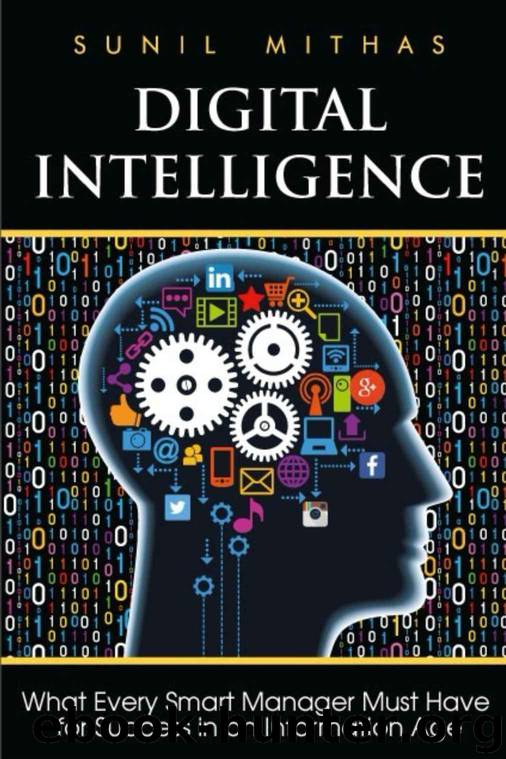Digital Intelligence: What Every Smart Manager Must Have for Success in an Information Age by Sunil Mithas

Author:Sunil Mithas [Mithas, Sunil]
Language: eng
Format: azw3
Publisher: Finerplanet
Published: 2016-01-12T05:00:00+00:00
6.6 Implications for policy
From a policy perspective, the results of prior studies suggest that despite the amenability of information-intensive occupations to offshoring, on average, high-information-intensive occupations have not yet experienced a decline in employment or salary growth. Although information-intensive jobs are more likely to be offshored in the long run, there appears to be no current need for policies specifically designed to avoid the migration of information-intensive jobs overseas.
To the extent that developed economies such as the United States and the United Kingdom enjoy a surplus on the whole from the free flow of business services (exports being more than imports), and though their share of service imports (0.9% in 2001 in the United States) is significantly less than that of their manufacturing imports, any restrictions on global trade in services will only make their current account deficits larger.
At the same time, governments are responsible for ensuring that gains from globalization and trade are allocated equitably and that workers are equipped with education and retraining to cope with macroeconomic forces that affect the jobs and wages of individual workers. One of the disconcerting aspects in this context is that the cost of creating jobs has grown from a few thousand dollars to nearly a hundred thousand dollars over the last thirty years.[170] Foxconn (or Hon Hai) employs more workers than Apple, Dell, Microsoft, HP, Intel and Sony combined. The United States has to find a way to provide meaningful jobs for the masses to maintain social harmony and to avoid the potential downsides of a winner-takes-all economy.
Another implication for policy relates to high-skill immigration. It is often tempting to become insular and restrict entry or employment of high-skilled foreign-born workers or to delay their citizenship. But succumbing to these temptations would be unwise, particularly if such temptations are based on anecdotes. An academic study of over 50,000 information technology professionals provides evidence to support the benefits of employing highly skilled foreign workers in the United States.[171] Contrary to popular beliefs, this study found that foreign IT workers in the United States earn a salary premium of between 5 per cent and 9 per cent over US IT workers’ salaries. Some critics claim that foreign-born workers substitute for US workers; that they work for lower wages and depress the wages of US citizens. The finding that US firms pay the foreign IT workers a premium over IT workers who are US citizens implies that these foreign workers are not substituting for US workers. In fact, foreign and US IT workers may be complements: employing one group enhances the job opportunities of the other.
Why might companies operating in the US pay a foreign worker more than a US citizen? One explanation may lie in the intangible aspects of human capital. A foreign-born IT worker shows flexibility in her willingness to move to a new country and is willing to take a risk, optimistic that such a move will have real benefits. This worker is highly motivated, and is willing to work flexibly at any location her employer chooses, whether within the US or abroad.
Download
This site does not store any files on its server. We only index and link to content provided by other sites. Please contact the content providers to delete copyright contents if any and email us, we'll remove relevant links or contents immediately.
Hit Refresh by Satya Nadella(9125)
The Compound Effect by Darren Hardy(8943)
Change Your Questions, Change Your Life by Marilee Adams(7759)
Nudge - Improving Decisions about Health, Wealth, and Happiness by Thaler Sunstein(7692)
The Black Swan by Nassim Nicholas Taleb(7106)
Deep Work by Cal Newport(7063)
Rich Dad Poor Dad by Robert T. Kiyosaki(6608)
Daring Greatly by Brene Brown(6501)
Principles: Life and Work by Ray Dalio(6421)
Playing to Win_ How Strategy Really Works by A.G. Lafley & Roger L. Martin(6236)
Man-made Catastrophes and Risk Information Concealment by Dmitry Chernov & Didier Sornette(6005)
Big Magic: Creative Living Beyond Fear by Elizabeth Gilbert(5754)
Digital Minimalism by Cal Newport;(5749)
The Myth of the Strong Leader by Archie Brown(5499)
The Slight Edge by Jeff Olson(5410)
Discipline Equals Freedom by Jocko Willink(5378)
The Motivation Myth by Jeff Haden(5204)
The Laws of Human Nature by Robert Greene(5172)
Stone's Rules by Roger Stone(5081)
